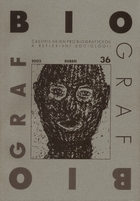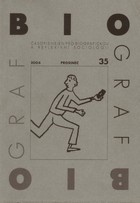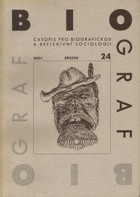
DAVID, G. (2005): Žertování o cenách v arabských koloniálech: Jak mohou citlivá témata proměňovat mezi-skupinové vztahy. Biograf , (36): 25-54 - přeložil Zdeněk Konopásek
, (36): 25-54 - přeložil Zdeněk Konopásek
::::Tensions between small immigrant-owned stores and their African-American customers are frequently cited as a major problem in large urban cities in the United States. Whereas most research has focused on the problematic nature of this relationship, the research reported in this paper attempts to focus on the positive. Rather than being plagued by tensions and problematic encounters, this paper asserts that interactions in small "convenience stores" are largely unproblematic. This paper examines the occurrence of unproblematic cross-cultural encounters as a collaborative effort between customer and worker. Specifically, this paper demonstrates how humor plays an important role in the formation of positive relationships through the analysis of "price humor". While high prices have been cited as a source of tension, this paper shows how sensitive topics, such as price, can be used by interactants to build rapport across the counter.

GUILLEMIN, M. / GILLAM, L. (2004): Etika, reflexivita a "eticky důležité okamžiky" ve výzkumu. Biograf , (35): 11-31 - přeložili Zdeněk Konopásek a Jiřina Zachová
, (35): 11-31 - přeložili Zdeněk Konopásek a Jiřina Zachová
::::Ethical tensions are part of the everyday practice of doing research—all kinds of research. How do researchers deal with ethical problems that arise in the practice of their research, and are there conceptual frameworks that they can draw on to assist them? This article examines the relationship between reflexivity and research ethics. It focuses on what constitutes ethical research practice in qualitative research and how researchers achieve ethical research practice. As a framework for thinking through these issues, the authors distinguish two different dimensions of ethics in research, which they term procedural ethics and "ethics in practice". The relationship between them and the impact that each has on the actual doing of research are examined. The article then draws on the notion of reflexivity as a helpful way of understanding both the nature of ethics in qualitative research and how ethical practice in research can be achieved.
Přeloženo z originálu GUILLEMIN, M. / GILLAM, L. (2004): Ethics, reflexivity, and "ethically important moments" in research. Qualitative Inquiry, 10 (2): 261-280

FINE, G.A. (2001): Jak se dělá příroda a ochočuje divočina: Problém "vysbírávání" lesů v houbařské kultuře. Biograf , (24): 29-56 - přeložil Zdeněk Konopásek
, (24): 29-56 - přeložil Zdeněk Konopásek
::::Although nature often has been treated as an unproblematic reality, I argue for treating it as a contested concept, suggesting that "nature" is a cultural construction. Drawing on interactionist and ecological theory, I claim that the creation of social problems involving the environment is inevitably grounded in cultural choices. Through a set of ideological structures (a protectionist vision, an organic vision, and a humanistic vision), social actors develop templates for understanding the proper relationship between humans and nature. Based on an ethnography of mushroom collecting, I contend that these models lead us to experience nature through cultural eyes - wishing to be away from civilization, to be at one with nature, and to engage in the pragmatic use of nature for personal ends. Conflicting stances toward nature account for debate over the moral acceptability of the commercial collection of mushrooms and the "problem" of overpick. Templates of human-environmental interaction, leading to models for experiencing the wild, provide the basis for understanding the conditions under which environmental change is defined as a social problem.
FINE, G.A. (1997): Naturework and the taming of the wild: The problem of "overpick" in the culture of mushroomers. Social Problems, 44 (1): 68-88

ASHMORE, M. / REED, D. (2001): Nevinnost a nostalgie v konverzační analýze: dynamické vztahy mezi nahrávkou a jejím přepisem. Biograf, (25): 3-23 - přeložili Lenka Buštíková, Zdeněk Konopásek a Ivan Vodochodský
::::This paper attempts an analysis of some of the methodological practices of Conversation Analysis (CA); in particular, tape recording and transcription. The paper starts from the observation that, in the CA literature, these practices, and the analytic objects they create (the tape and the transcript), are accorded different treatment: simply put, for CA the tape is a "realist" object, while the transcript is a "constructivist" one. The significance of this difference is explored through an analysis of the dynamics of CA practice. We argue that the "constructivist transcript" is premised on an understanding of CA as predominantly concerned with maximising its "analytic utility": a concern of one distinct temporal stage of CA work: that of the "innocent" apprehension of objects in the "first time through". The "realist tape", in contrast, is based on a different aspect of the work of CA: its quest for greater "evidential utility", achieved by the "nostalgic" revisiting of previously produced objects for purposes of checking them against each other; work done in the "next time through". We further argue that both the ontology and the epistemology of CA[a]s objects are changed in any next time encounter. We conclude with a cautionary speculation on the currently-projected, transcript-free, digital future of CA.
ASHMORE, M. / REED, D. (2000): Innocence and nostalgia in conversation analysis: The dynamic relations of tape and transcript. Forum Qualitative Sozialforschung / Forum: Qualitative Social Research, 1(3): 45 odst., čl. 3. Dostupné na adrese http://nbn-resolving.de/urn:nbn:de:0114-fqs000335

 ? - recenze vyjde v časopise Biograf
? - recenze vyjde v časopise Biograf
 se objevily informace o tom, co lze snad prý během března čekat v nové, sedmé verzi mého oblíbeného analytického programu
se objevily informace o tom, co lze snad prý během března čekat v nové, sedmé verzi mého oblíbeného analytického programu



